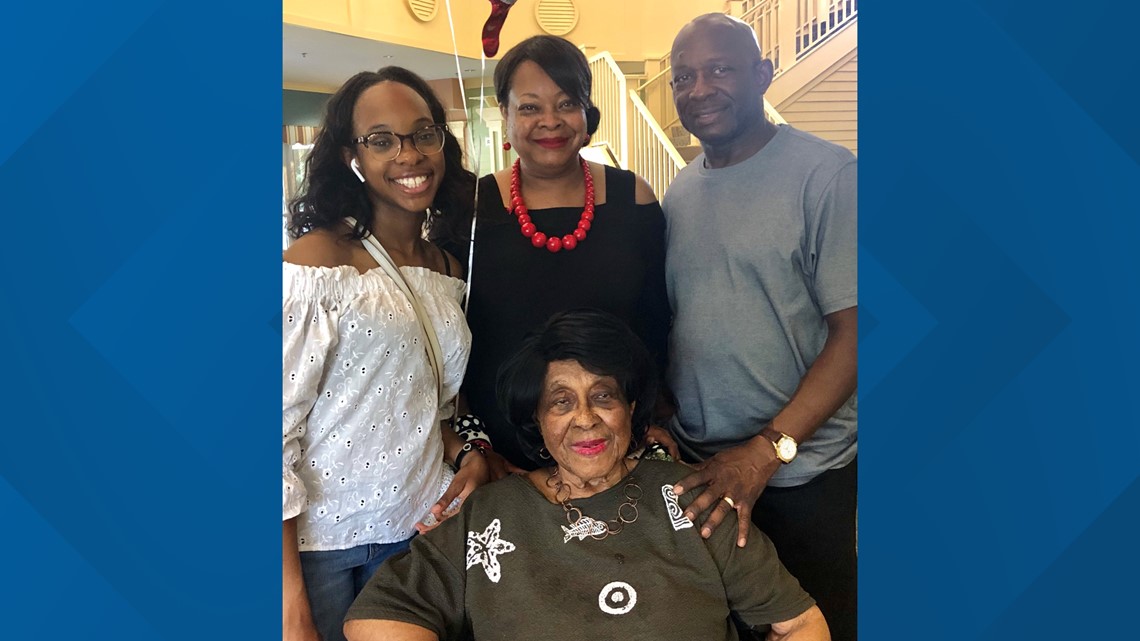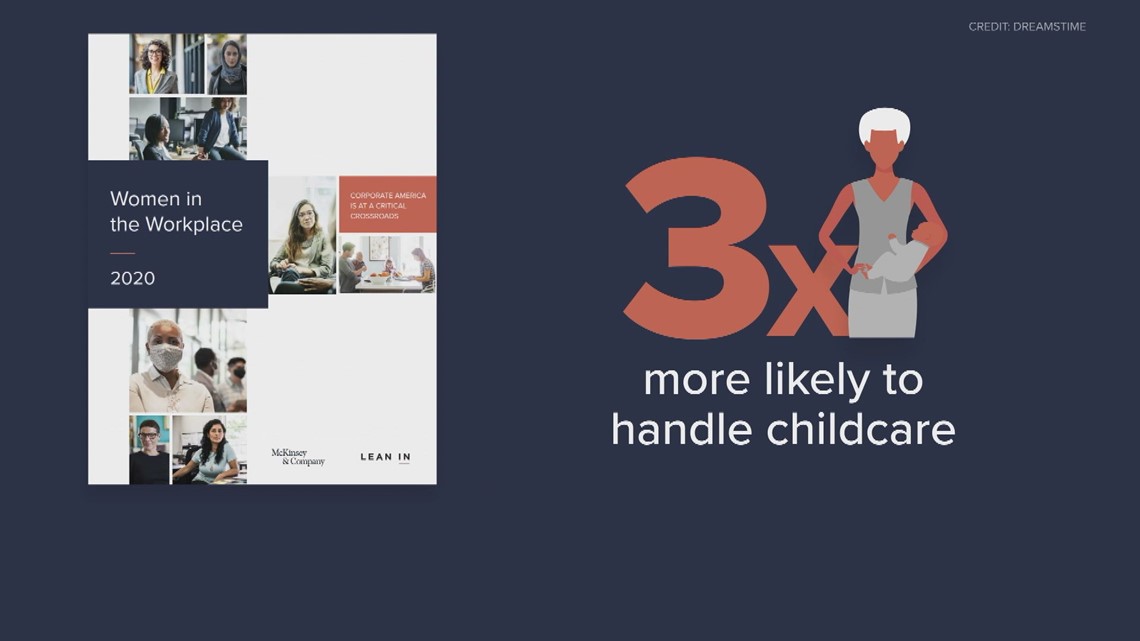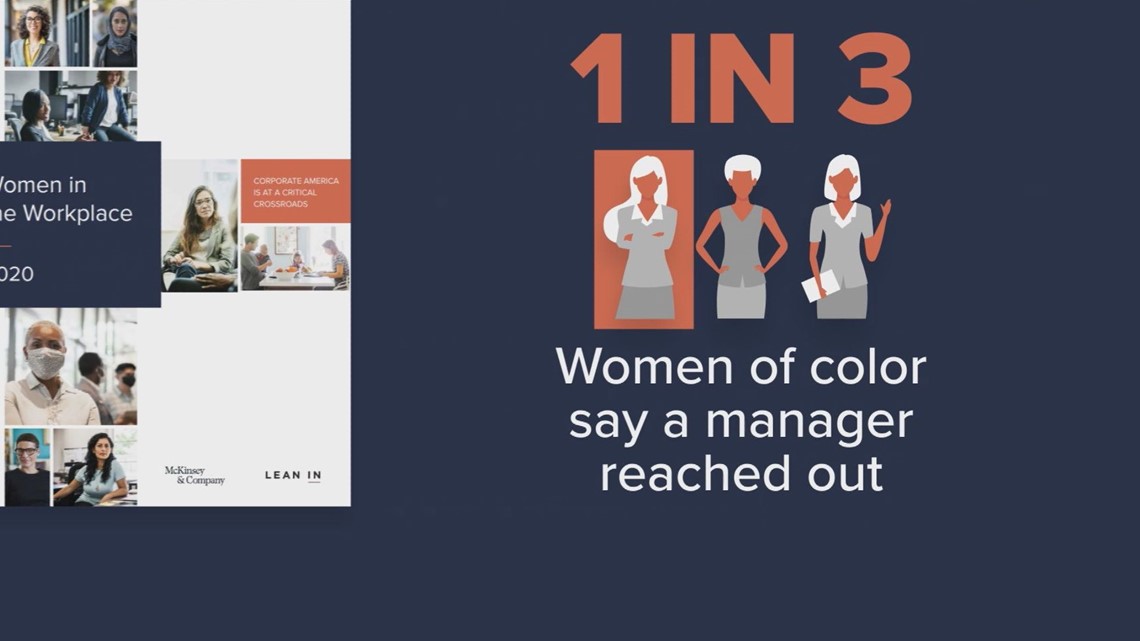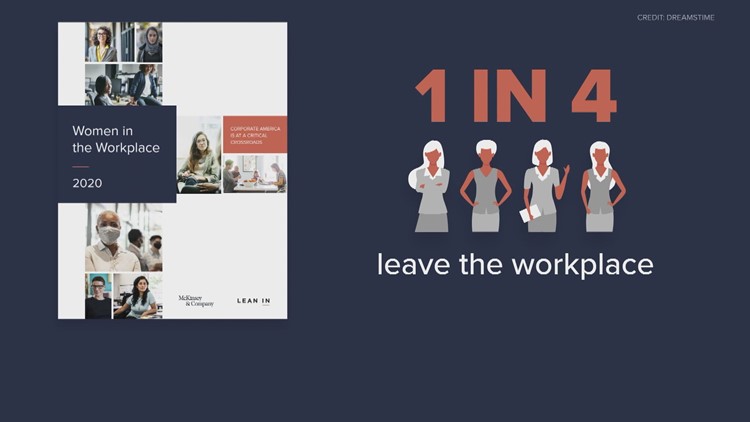Day in and day out, they are in our hospitals, schools, labs, and grocery stores. Women are standing shoulder to shoulder with men on the front lines of this global pandemic.
While we might take for granted the role women play in our 2020 workforce, the coronavirus could be the ugly reminder that we haven't come far enough.
A new study by McKinsey & Company and Leanin.org warns the coronavirus could erase years of progress for working women. It suggests one in four women are considering taking a step back or leaving their jobs altogether.
Sara Leaders is one of them.
She was ready for a new chapter. Her two-year-old, Lana was set to start preschool, and Leaders was antsy to get back to work. But when the global pandemic hit, her plans were derailed.
"Wow I really need to make some different choices now," said Leaders.


Kharon Chapper, a teacher in Polk County, Florida was climbing the ladder to assistant principal. In March, Chapper was torn between protecting her 90-year-old mother from the coronavirus, who had recently moved in with her family or taking a new role at a school that would position her for assistant principal.
These women are not alone. According to research, one in four women are considering leaving the workforce or downshifting their careers because of the pandemic.


"We were shocked actually," said Jess Huang, co-author of the McKinsey report, adding, "That’s the first time in the history of our research that we’ve seen that men and women are considering leaving the workforce at different rates."
The report found women are bearing the burden of the caregiving crisis amid the pandemic. Mothers are three times as likely than fathers to be responsible for childcare.


"Forty percent of mothers report that they’re spending three or more hours per day on household care or childcare responsibilities," said Huang.
This doesn’t just hurt women for the time being. This hurts long term because research found females in top positions are more likely to help other women on the career climb.
This kind of setback could impact the pipeline for years because as Huang noted, "Senior women tend to be bigger champions of diversity and inclusion in the workplace."
That’s one thing Sara Leaders has going for her. Her female CEO at Rock Solid Fitness is allowing her to work part-time until she can get her daughter back into preschool.
Leaders is grateful her boss appreciates a work/life balance adding, "She has a thought process- if you’re good at home, you’re going to give me the best when you’re here."
Researchers suggest employers act quickly to address burnout and get creative to accommodate female workers and their mental health. We've listed the suggestions but you can get more detail in this report.
1) Make work more sustainable
2) Reset norms around flexibility
3) Take a close look at performance reviews
4) Take steps to minimize gender bias
5) Adjust policies and programs to better support employees
6) Strengthen employee communication
WOMEN OF COLOR
The analysis found alarming trends regarding women of color.
Black women are more than twice as likely as women overall to lose a loved one during the COVID-19 pandemic.
The women surveyed also revealed our country’s incidents of racial injustice are weighing heavily on their emotional state.
"This pandemic and what’s going on as a result of this pandemic is not the first time we’re overlooked. It’s not the first time we have been directly affected by something that people see and hear and know about and do nothing," said Kharon Chapper.
The report found only one in three women of color say a manager reached out to see how they’re doing following racial incidents of violence.


Chapper said not one of her supervisors checked on her mental health or emotional well-being in the events following George Floyd's death which resulted in a nationwide reckoning about systemic racism and racial injustices.
"It would have been huge. That would have been…I see you. I may not be able to relate to it and nowhere near the degree that you can relate to it and others like you... but I see you," said Chapper.


According to McKinsey & Company, employers can better support Black women by:
1. Address the distinct challenges of Black women head-on
The first step is making a public and explicit commitment to advancing and supporting Black women. This commitment should be communicated to employees, along with a clear explanation of why it’s important.
2. Foster a culture that supports and values Black women
Companies need to foster a culture in which Black women—and other traditionally marginalized employees—feel like they belong. There are two equally important parts of this: making it clear that disrespectful behavior won’t be tolerated and taking proactive steps to make sure that Black women feel valued and welcome.
MORE RESOURCES:
What other people are reading right now:
- Cindy McCain says her husband would have been 'very pleased' by Biden's win, report says
- Tracking Eta: Latest track from NHC shifts west, takes Tampa Bay out of the forecast cone
- Navy sailor from Florida killed in Pearl Harbor laid to rest nearly 80 years later
- 'I am worried': Hospital staff monitoring rise in cases in Tampa Bay, urge communities to use COVID-19 mitigation measures
- Pfizer says early data signals COVID-19 vaccine is effective
- 2020 Election Results | Get live results from 10 Tampa Bay
►Breaking news and weather alerts: Get the free 10 Tampa Bay app
►Stay In the Know! Sign up now for the Brightside Blend Newsletter



